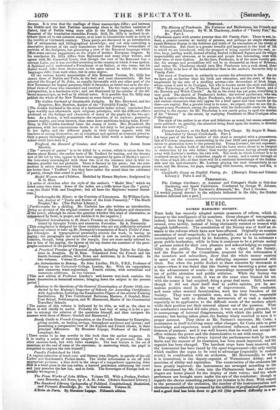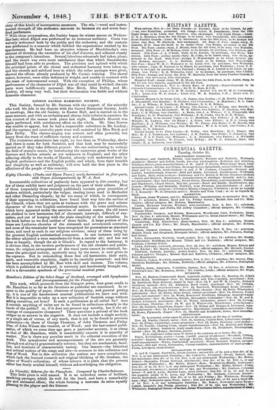MUSIC.
SACRED HARMONIC SOCIETY.
Tens body has recently adopted certain measures of reform, which do honour to the intelligence of its members. Great changes of management, indeed, have long been called for; but it is well when such calls are an- swered, even tardily, instead of being obstinately resisted or treated with sluggish indifference. The constitution of the Society was of itself an ob- stacle to the reforms which have now been effected. Originally an amateur association of small magnitude, it has gradually, and in a manner neither contemplated nor expected by its founders, grown to be in substance a great public institution, while in form it continues to be a private society of persons united for their own pleasure and acknowledging no responsi- bility to the public. Pecuniary gain is no object of the Society; and the Reports of the Committees, prepared for the information of the members and subscribers, show that the whole money received is spent on the concerts and in defraying expenses connected with them. But when the public flocked to these concerts by thousands at a time—when it was found that this Society was becoming a great agent in the advancement of music—its proceedings necessarily became mat- ter of public attention and public criticism. While the Society was lauded for doing so much, it was at the same time blamed for not, with the means it had acquired, doing a great deal more. Still, however, though it did not show itself deaf to public opinion, yet its ano- malous position stood in the way of improvement. The conductor, and some other musical functionaries, were the very founders of the Society. They were respectable men, and, in their way, respectable musicians, but unfit to direct the movements of' so vast a machine, especially in its application to the difficult music of the modern school; while their position put their removal almost out of the question. When the conductor's removal did take place, it was not on public grounds, but in consequenca of internal disagreements, with which the public had no concern; but having taken place, the Society wisely resolved to turn it to proper account. They chose as Mr. Surman's successor, Mr. Costa; a nomination in itself involving many other changes; for Costa adds to great knowledge and experience, much professional influence, and uncommon firmness of purpose; and it was well known that he would not accept the office without the power and the determination to act with energy. The organ, which has always injured the performances both by its own faults and the manner of its treatment, has been much improved, and the organist has been changed. The harshest stops have been removed, and the instrument has been tuned by the equal temperament—the only tuning which enables the organ to be used to advantage (especially in modern music) in combination with an orchestra. Mr. Brownsmith, to wham it is committed, is the deputy-organist of Westminster Abbey, and a musician of ability and reputation. The construction of the orchestra has been greatly improved: the instruments are arranged according to the plan introduced by Mr. Costa into the Philharmonic band; the chorus- singers are better placed for the display of their voices; and the whole performers are brought more under the eye of the conductor; though as regards the chorus something perhaps yet remains to be done. With respect to the personnel of the orchestra, the number of the instrumentalists and choristers is considerably increased by the addition ofprofessional perf.ormern: and a good deal has been done to get rid (the greatest difficulty us a so-
ciety of this kind) of incompetent amateurs. The win vocal and instru- mental strength of the orchestra amounts to between six and seven hun- dred performers.
• ':With these preparations, the Society began its winter season on Wednes- day last; when Elijah was performed to an immense audience. Costa was warmly welcomed both by the public and the orchestra; and the oratorio was performed in a manner which fulfilled the expectations excited by his appointment He had been an attentive witness of Mendelssohn's own manner of directing the execution of his chef d'o3uvre, and adhered closely to the composer's intentions. Several laborious rehearsals had taken place; and the result was even more satisfactory than that which Idendels.sohn himself had been able to produce. The precision and aplomb with which the principal points of the choral and orchestral harmony were taken up, and the smooth and subdued tone in which the softer passages were given, showed the effects already produced by Mr. Costa's training. The choral voices, however, were often deficient in weight, and unable to contend with the mass of instrumental sound. With the exception of Phillips, whose performance of the character of Elijah was all that could be wished, the solo parts were indifferently executed: Miss Birch, Miss Dolby, and Mr. Dockey, all sang very well, but their declamation was feeble and without dramatic character.

























 Previous page
Previous page